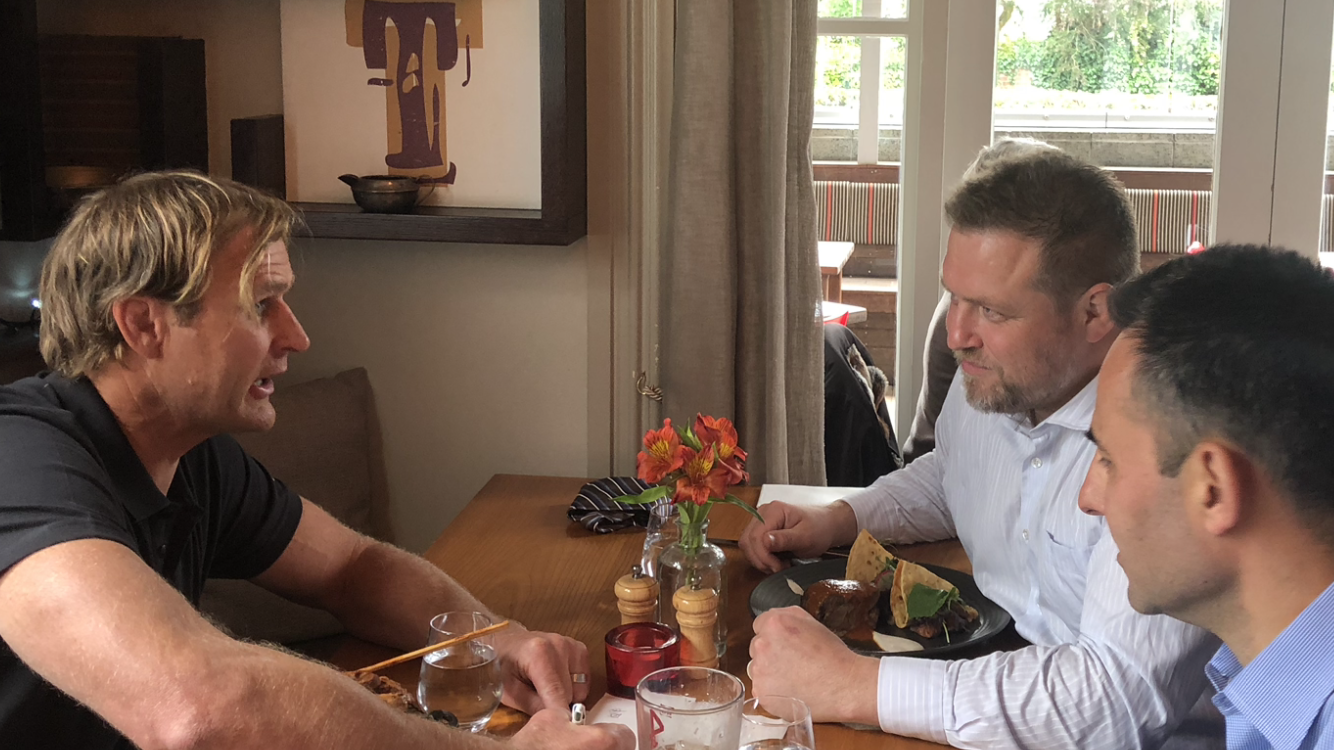Four questions you should ask a fund manager
On Tuesday in Christchurch, Platinum Asset Management presented a grant to the Crusaders as winners of Australasia’s Best Sporting Team. This grant will be used to benefit members of the rugby community facing hardship.
Following the presentation, Ben Darwin of GAIN LINE Analytics and I had lunch with coach, Scott Robertson. Scott led the team to Super Rugby titles in 2017 and 2018, making it an incredible nine titles in the competition’s 23-year history. Robertson won four titles as a Crusaders player between 1996-2003 and was generous with his time in sharing insights into applying his philosophy and lessons more broadly.

Pictured: Scott Robertson (Crusaders Head Coach), Ben Darwin (GAIN LINE Analytics) and Douglas Isles (Platinum Asset Management)
Scott talked of the importance of his mentor, Rob Penney, when he started as a defence coach at Canterbury, the province that feeds the Crusaders and which shares the facility we visited. Penney was a product of the Canterbury system on his way to becoming a successful head coach, winning four national provincial titles in a row. ‘Razor’, as Robertson is widely known, noted that in his early years, the key was to focusing on education and asking lots of questions, but also about learning “to be yourself skilfully” and discovering a personal style.
His style was surprisingly warm, almost spiritual, for a man who had been a combative All Black back rower, yet who had surfed prior to our meeting. Our visit, which was reminiscent of great analyst site visits, gave me a real sense of the community spirit engendered throughout the Crusaders. We met and talked to all the staff about the award, recognising sustained success.
In their quest for excellence the Crusaders benchmark themselves not just against their rivals but against the best in other leagues or sports.
Teams like the Broncos and Storm in Rugby league, Geelong or Hawthorn in the AFL or further afield, leading rugby clubs like Saracens and Leinster. To win an award against teams they look up to means a lot to this humble group.
Scott demonstrated a strong set of beliefs; his deep desire for greatness requires purpose which in turn needs inspiration. We were shown around the impeccable facilities where images and trophies express what has gone before.
As a coach, he talked of the need to show people where they are going and of bringing everyone along, including the players’ families, and winning the hearts and minds of the community - a small city devastated by the 2011 earthquake yet with a champion team.
Our discussion on precognitive communication was most insightful and worthy of further exploration. The idea is to understand what personality type you are, but also to know that of your team mates in order to improve interaction. Detail people, feel-good people, creatives and those who need guidance, need to be treated differently, and everyone needs to respect each other.
Bringing young people through is an essential part of continuing to build a dynasty, and Razor talked about the importance of the debut in a players’ journey, a big event, and maximising their opportunities to succeed by allowing them freedom to perform. The idea of having intermediate players welcome and guide the novices is based on military concepts.
The Crusaders have become an All Blacks production line with 75 coming through to date.
They appear to be a highly tuned system, within the broader world-leading system of NZ Rugby, designed to deliver success, with stability enabling a deep culture and internal trust to develop.
These observations were consistent with a team that scores very highly when GAIN LINE looked at their cohesion and their success in ABST is a result of this.
The decision to develop or churn people is critical and most teams and corporates, desperate for immediate success, often make the wrong choice.
Platinum has worked with GAIN LINE since 2017 and last year they analysed Platinum’s team (which rated very well!). Platinum generally hires inexperienced analysts from varying backgrounds and then develops them. This is perhaps at odds with an industry, on the whole, that craves a ‘star’ manager. However, the daily competition with the stock market requires careful consideration of team structure, right down to the importance we see in being based in one location to enable the continuous debate critical to our investment process.
GAIN LINE’s work provides a useful tool in thinking about corporates to invest in, but it could give a critical edge for advisers and researchers when assessing fund managers.
GAIN LINE’s work suggests shared experience leads to successful sporting outcomes. In our world, it suggests hiring analysts unpolluted by other managers’ philosophies and retaining these staff as they develop.
Four questions you should ask a fund manager
When looking at Fund Managers it could help to ask:
- How much collective experience does the team have? (Positive)
- How much external investment experience did they bring? (Negative)
- How is the team structured? (Our “Team of Teams” model accelerates cohesion development)
- For leavers, interrogate their real contribution to confirm any genuine impairment. Be careful not to over-value people from strong teams and vice versa.
Platinum’s previous work with GAIN LINE led to understanding team ’cohesion’ as a key driver of success. ABST is the next iteration in measuring and recognising success to emphasise that how teams are built is critical for investors in funds, in companies or in managing a business.
1 stock mentioned

